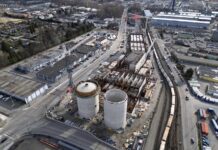THE Metro Vancouver region is well positioned to lead the next global wave of clean transportation innovation and industry development, but risks losing key industry players if barriers to investment and future industry growth are not urgently addressed, according to a new report from Invest Vancouver.
The report, Clean Transportation: Actions to Strengthen the Sector in the Metro Vancouver Region, identifies 13 recommendations, informed by input from leaders in clean transportation, and includes three key priorities around modernizing and streamlining the permitting process, improving access to highly-limited “heavy” industrial space, and supporting a hydrogen hub to accelerate industry growth.
“By having government, industry, academia, and researchers work together, the Metro Vancouver region can take advantage of its strategic advantages in clean transportation, especially in the hydrogen sector, to assume a place as a global leader in the research, development, production, and export of new mobility solutions to climate change,” said Sav Dhaliwal, Chair of the Invest Vancouver Management Board and the Metro Vancouver Board of Directors. “Invest Vancouver’s Clean Transportation: Actions to Strengthen the Sector in the Metro Vancouver Region offers valuable findings, analysis, and actionable recommendations to support this vital industry sector in B.C.”
Metro Vancouver has a burgeoning clean transportation sector, including business clusters and industrial specializations in low- and zero-emission vehicles and components, low-carbon fuels and charging infrastructure, plus an advanced and growing hydrogen cluster. Firms overwhelmingly attribute access to a deep talent pool and experienced workforce as a major appeal of the region. Within the last five years, the 60 export-oriented firms identified in the report attracted more than $2.6 billion in capital investment to the region.
“We have the opportunity to solidify our global position in this soon-to-be multi-trillion-dollar sector, but only if we remove systemic regional barriers to investment,” said Jacquie Griffiths, Executive Vice President of Invest Vancouver. “We heard loud and clear from industry leaders that if we don’t act soon on some of the acute pain points, then we will risk losing industry capacity and firms to other regions that don’t present such challenges.”
The report outlines three priority areas for improvement:
* Permit Process Streamlining:
A clear, timely, and technology-based municipal permitting process is a top priority for sector growth within the region. Permit delays are a significant barrier to success for clean transportation firms and hamper future investments in this sector.
* Physical Space Requirements:
Suitable physical spaces are necessary, especially for businesses engaged in hydrogen fuel cell and low-pressure storage development. However, the region’s industrial vacancy rate has fallen below one per cent. The report recommends investing in spaces to be leased to firms at below-market rates, and subsidizing energy upgrades to existing warehouses to meet the higher power demands of clean transportation research and development.
* Cluster Development Opportunities:
A cluster of hydrogen-focused businesses has developed over the last three decades in the region, however the global market has since caught up and incentives are required to support further growth in this sector. Invest Vancouver recommends several actions to strengthen the region’s productive advantages, such as launching a hydrogen hub supported by government and industry, creating a long-term electric power rate for hydrogen production, and funding a large-scale hydrogen-powered heavy-duty vehicle demonstration project.
“B.C. is a world leader in fuel cell technology for transportation, with major automakers and the fuel cell industry investing heavily in research and development in the province,” said Matthew Klippenstein, Regional Manager, Western Canada, and Branch Manager for the Canadian Hydrogen and Fuel Cell Association and Hydrogen BC. “We have the workforce, we have the applied research, and now we have one of the world’s a fastest-growing industries. Now is the time to make the public policy, system-based, and structural changes necessary to support this industry’s regional growth and global commercialization.”
Worldwide, interest and investment in clean transportation is gaining momentum. At this year’s UN Climate Change Conference, the Hydrogen Council CEO Coalition noted that hydrogen has a central role in helping the world reach net-zero emissions by 2050 and limit global warming to 1.5°C, and that within the next decade, global demand for renewable and low-carbon hydrogen could grow by 50 per cent. Bloomberg New Energy Finance predicts that by 2050, clean hydrogen will make up as much as 25 per cent of our net-zero energy mix, generating a $20-trillion infrastructure investment opportunity.
Clean Transportation: Actions to Strengthen the Sector in the Metro Vancouver Region is available at investvancouver.ca.












